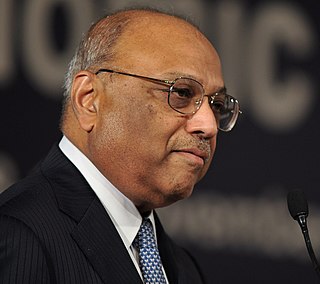A Quote by Richard P. Rumelt
A real strategy is a coherent mix of policy and action designed to overcome a significant challenge. So a sensible employee might indeed say that they have no idea what the organization's strategy is - because it seems to have none. Senior managers' so-called "strategies" are heavy with aspirations and goals, but light on how resources and strengths will be combined to achieve them.
Related Quotes
The single most damaging misconception about strategy is that it is a set of financial performance goals. The so-called "strategies" created by many managements are nothing more than three-to-five year financial performance forecasts. They are then labeled "strategy" and shipped off to the board of directors which goes through the motions of discussing how big the numbers are. Strategy is not your aspirations. Strategy is concerned with how you will arrange your actions and resources to punch through the challenges you face.
A good strategy is not always successful, but even an "inappropriate" strategy may be an actual strategy. A "bad strategy" is one that doesn't even try to address an important challenge. Instead, it speaks of aspirations, visions of the future, lays out performance goals, or simply lists a bunch of unconnected actions.
As with military campaigns, cultural warfare is always decided over the pragmatic problems of strategy, organization and resources. . . . The factions with the best strategies, most efficient organization, and access to resources will plainly have the advantage and very possibly, the ultimate victory.
One of the problems many leaders report is a gap between strategy and execution. Usually this "gap" arises because the so-called "strategy" is a set of financial performance goals, not an approach to overcoming challenges. The two key ways to narrow this gap are to avoid bad strategies that fail to explain how to proceed and to establish a proximate objective - something which can be accomplished and which will open the door to further progress.
Give serious thought to why your company should care about your strategy. Specifically, find problems that the board wants to be solved. What are senior managers scared of? Part of becoming a credible strategic thinker is learning effective approaches to selling ideas for your situation. You’ll know that you’re getting better at selling (or pitching) strategy when managers start coming to you when there is strategic thinking to be done.
The goals you set for yourself and the strategies you choose become your blueprint or plan. Strategies are like recipes: choose the right ingredients, mix them in the correct proportions, and you will always produce the same predictable results: in this case financial success. The success strategies for managing money and building wealth are called Money Strategies. By learning to use money strategies as a part of your day-to-day life, financial frustration and failure will become a thing of the past.
The opportunities and threats existing in any situation always exceed the resources needed to exploit the opportunities or avoid the threats. Thus, strategy is essentially a problem of allocating resources. If strategy is to be successful, it must allocate superior resources against a decisive opportunity.
You can talk all you want about having a clear purpose and strategy for your life, but ultimately this means nothing if you are not investing the resources you have in a way that is consistent with your strategy. In the end, a strategy is nothing but good intentions unless it's effectively implemented.






























